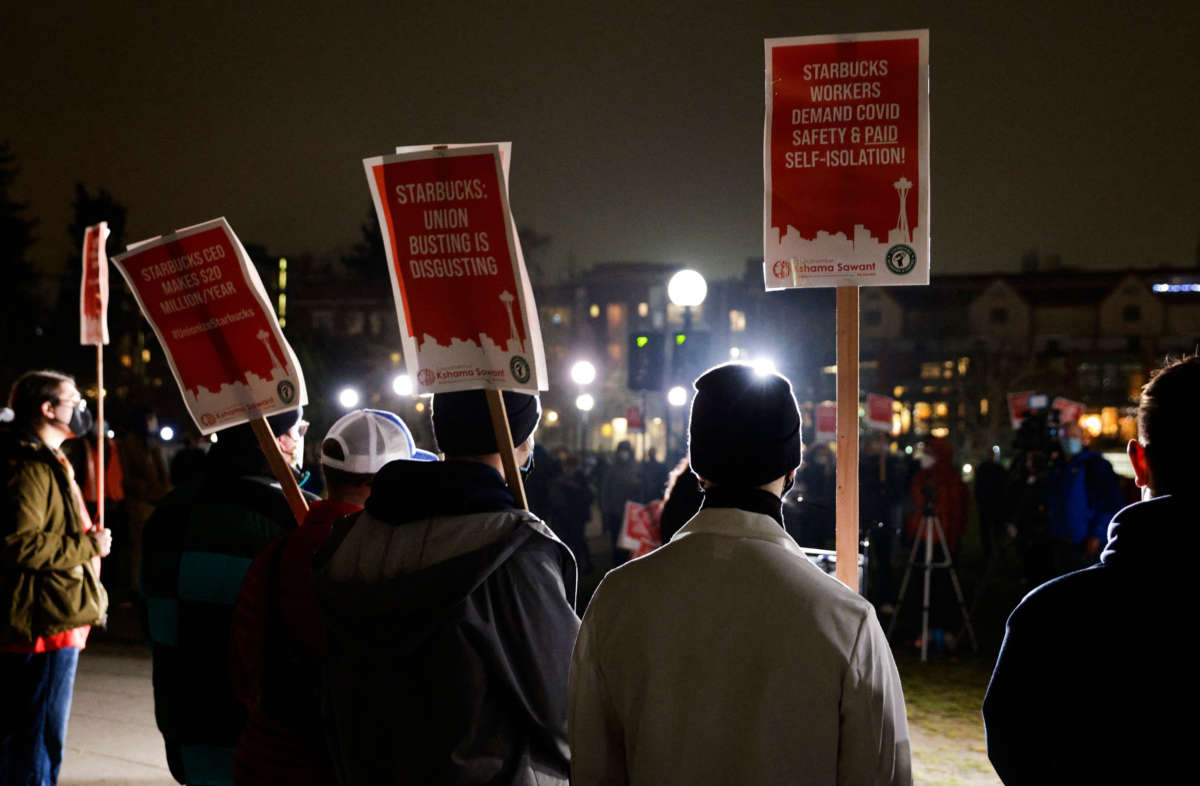Fifteen Starbucks locations are filing to unionize on Monday as workers at stores across the country wage a historic union drive.
Workers at stores in Ithaca, Buffalo and Rochester in New York will be filing, according to Starbucks Workers United, as well as workers at stores in California, Kansas, Missouri, Oregon, Washington and Arizona.
According to Starbucks Workers United, Monday is also the first day of collective bargaining for the two locations that have already unionized, the Genesee and Elmwood locations in Buffalo, New York. Meanwhile, ballots for the next three union elections in Buffalo are beginning to be mailed.
This milestone follows six stores – two locations in Philadelphia and four stores in Michigan – announcing union drives on Friday. Overall, a whopping 26 stores have filed for unionization just over the past week, bringing the total to about 54 stores that are unionizing, according to Starbucks Workers United. Many of those union filings took place in January alone.
Starbucks stores have been filing for unionization at a staggering pace. Many of the workers filing for unionization have cited similar working conditions: Corporate has little to no regard for COVID safety, there is no way to report grievances, workers are underpaid and stores are often understaffed, leading to a stressful work environment.
Despite the company’s supposed progressive values, corporate has been holding mandatory anti-union meetings, posting anti-union propaganda and even temporarily closing stores that are attempting to unionize. Last week, the company requested that the National Labor Relations Board (NLRB) stop or pause an ongoing union vote in Mesa, Arizona, in order to review rules that the NLRB has already set for the election.
Some “potential hazards” to Starbucks partners:
– repetitive stress injuries
– burns and cuts
– matcha dust
– creepy customersNot a “potential hazard” to Starbucks partners:
– collective bargaining
With a contract, we can negotiate health & safety language to reduce hazards! https://t.co/WUGKFXviYo
— jaz brisack (@jazbrisack) January 26, 2022
Meanwhile, workers in Boston-area stores have reported being forced to attend meetings in which management gives them pamphlets with anti-union messaging. The company claims, as many union-busting companies have done before, that the union would have “control” over the employees and that the union would “drive a wedge” between the company and its workers.
On Wednesday, workers from Allston, Massachusetts, sent a letter asking corporate to stop holding its so-called listening sessions.
“Although you have approached us with the goal of creating, in your own words, a ‘pro-partner and pro-fact’ environment, we have reached a team consensus that these meetings are antithetical to the spirit of the Starbucks mission and actively harm our store community for both our partners and customers,” the 17 workers wrote.
They said that the company has been “dismissive” toward concerns and that the meetings have had a “combative nature.” Though the company claims that forming a union would drive division, the workers wrote that the company’s meetings are actually making it harder for employees to foster a harmonious work environment.
The workers also said that the company has been peddling false information about the union – in one case, claiming that Buffalo workers only unionized because Workers United placed a plant in the region. At a later meeting, the company admitted that some of its anti-union messaging may have been factually inaccurate.
“Although we appreciate the honest acknowledgements that much of this information has been wrong, this does not redeem the trust we have lost in Starbucks,” the workers said.
A terrifying moment. We appeal for your support.
In the last weeks, we have witnessed an authoritarian assault on communities in Minnesota and across the nation.
The need for truthful, grassroots reporting is urgent at this cataclysmic historical moment. Yet, Trump-aligned billionaires and other allies have taken over many legacy media outlets — the culmination of a decades-long campaign to place control of the narrative into the hands of the political right.
We refuse to let Trump’s blatant propaganda machine go unchecked. Untethered to corporate ownership or advertisers, Truthout remains fearless in our reporting and our determination to use journalism as a tool for justice.
But we need your help just to fund our basic expenses. Over 80 percent of Truthout’s funding comes from small individual donations from our community of readers, and over a third of our total budget is supported by recurring monthly donors.
Truthout has launched a fundraiser to add 500 new monthly donors in the next 10 days. Whether you can make a small monthly donation or a larger one-time gift, Truthout only works with your support.
